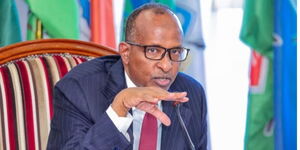Despite Kenya's Constitution granting citizens the right to recall their Members of Parliament, a legal vacuum and a previous High Court ruling have rendered the process virtually impossible.
This became a burning issue following the public's angry reaction to the passing of the Finance Bill 2024 on June 25 last year, when demonstrations across the country ended in violence and loss of lives.
The events highlighted a profound sense of betrayal among sections of Kenyans, prompting a nationwide discussion on how to hold their elected leaders accountable.
The constitutional provision for recalling MPs, found in Article 104, states that Parliament must enact legislation to define the grounds and procedures for such a recall.
Recall Process
Parliament attempted to do this with the Elections Act of 2011, which outlined a rigorous process.
To remove an MP from office, a High Court must first confirm their guilt for specific reasons, such as mismanagement of public funds, violations of the Elections Act, or breaches of Chapter Six of the Constitution. After this, a recall petition must be signed by at least 30 per cent of registered voters in the constituency, and all signatures need to be collected within 30 days.
However, in 2017, a High Court ruling in the case of Katiba Institute and another vs the Attorney General declared these provisions unconstitutional.
A three-judge bench found that the law was deliberately designed to be unworkable and discriminatory, effectively making the constitutional right to recall a symbolic gesture rather than a practical tool for accountability.
The court declared sections of the Elections Act and the County Governments Act "meaningless and superfluous", ordering Parliament to create a fair and accessible recall mechanism.
Dormant Power
Years later, Parliament has yet to rewrite the law, leaving a critical gap in the legal framework.
Even with the reconstitution of a new Independent Electoral and Boundaries Commission (IEBC) and a surge of citizen petitions, the electoral body's hands are tied.
The IEBC has explicitly stated that it cannot process recall petitions because there is currently no "enabling legislation defining the grounds and procedures for recall."
While the right to recall an MP exists in the Kenyan Constitution, it remains a dormant power. The lack of political will to create a functional legal framework has left citizens with a constitutional right they cannot exactly exercise.












